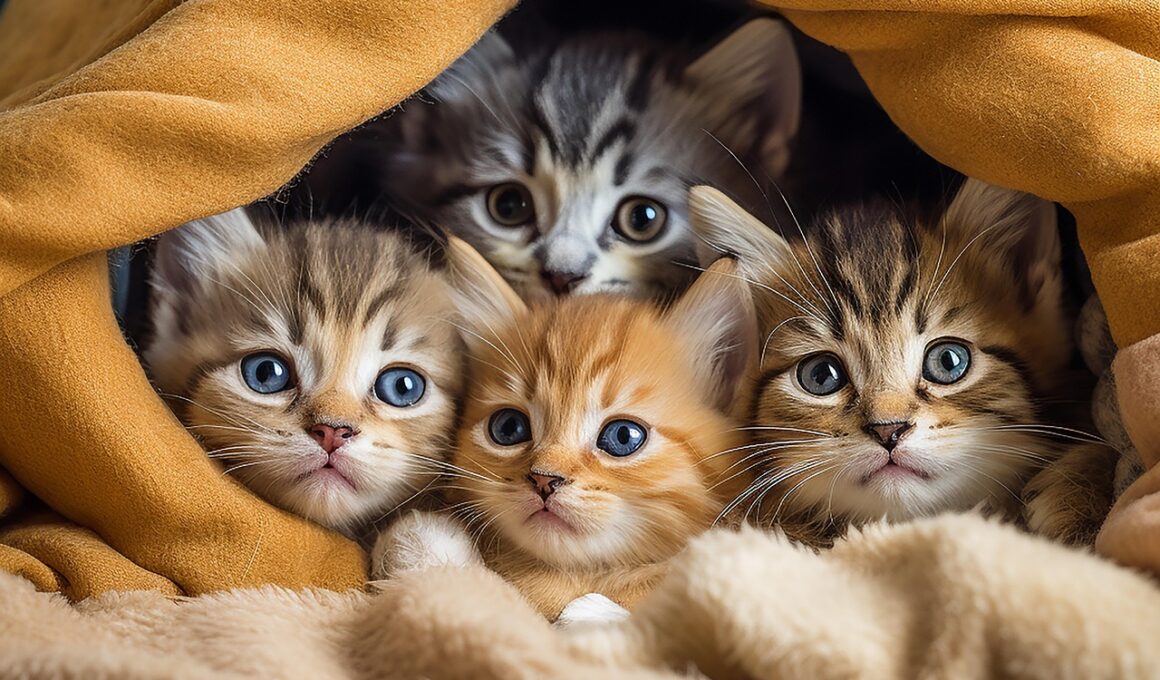Understanding Kitten Socialization
Socialization in kittenhood is a crucial development phase that shapes a cat’s personality. This period, typically between two and nine weeks of age, allows kittens to learn important behaviors. It is during this time that they become familiar with new experiences, sounds, and people. An effectively socialized kitten will likely grow into a well-adjusted adult cat. However, neglecting this period may lead to long-term socialization issues. It is essential for owners to facilitate positive interactions with their kittens, ensuring they meet various situations with confidence. Introducing them to new environments, different people, and other pets can create a stable personality. If you’ve adopted a kitten, it’s wise to prioritize these interactions early on. Observing their behavior during these encounters can provide insights into their comfort levels. Signs of fear or aggression may indicate a lack of socialization or negative experiences. Karen Becker, a renowned veterinarian, underscores the importance of these early experiences in determining a cat’s temperament later in life. Regular exposure to different stimuli can greatly enhance a kitten’s adaptability and confidence in handling unfamiliar situations. Thus, effective socialization practices can foster a positive environment for growth.
Common Socialization Challenges
While many kittens adjust well to their environments, others may display behaviors that are concerning. Understanding these challenges is essential for any cat owner. Some common issues include excessive fear of people or loud noises, aggressive tendencies towards other animals, and difficulty adapting to new environments. These types of challenges can hinder a kitten’s development and contribute to behavioral issues later, complicating their transition into adulthood. It’s vital to recognize the signs early on; this includes hissing, hiding, or a raised tail when encountering unfamiliar sights or sounds. Consult with a veterinarian if you notice any concerning signs. Often, these behaviors can be corrected with the right intervention strategies and support. Early socialization plays a valuable role in preventing these challenges. Create a safe, stimulating, and playful environment for your kitten to explore. Gradually introduce them to new situations while ensuring that these events are rewarding and stress-free. Utilizing positive reinforcement techniques can help solidify good behaviors while reducing anxiety. Proper socialization will ultimately result in a confident, friendly, and well-adjusted adult cat that thrives in any situation.
It is essential for owners to know when to seek professional help for kitten socialization issues. If your kitten exhibits consistent fear or aggression, it may be time for specialized assistance. A professional behaviorist or veterinarian can provide valuable insights and strategies tailored to your kitten’s specific needs. Behavioral evaluation can uncover underlying issues, making it easier to create an effective socialization plan. Additionally, trainers can guide owners on proper techniques to alleviate anxiety and encourage positive behaviors. Implementing advice from qualified professionals can foster a supportive and nurturing environment for your kitten. Recognize that every kitten is unique, and socialization experiences can vary significantly. Don’t hesitate to reach out if your situation feels overwhelming. The sooner you seek help, the more successful the socialization process can become. Owners should be proactive in addressing issues rather than waiting for them to resolve themselves. Investing the time and effort to rectify these issues now can lead to a fulfilling and harmonious relationship with your pet in the years to come. Establishing a robust support system of professionals is crucial to overcoming socialization challenges that affect your kitten’s growth.
Implementing gradual exposure techniques can help ease the kitten into their new social environment. This method involves slowly introducing your kitten to new stimuli to prevent overwhelming experiences. Start with lower-stress situations, such as allowing your kitten to observe new people from a distance. Gradually reduce the distance as they become more comfortable. Each interaction should be a positive experience, incentivized with treats or praise to build confidence. Ensure that these exposures happen in a controlled and safe manner. Keep in mind that patience and consistency are vital during this process. Some kittens may take longer than others to adapt, so it is crucial to respect their comfort levels. Monitor their reactions, and be ready to step back if they show signs of distress. Likewise, regular play sessions with gentle interaction will promote bonding and reinforce positive social behaviors. Be aware that proper timing is essential; introducing them to an entirely new situation right after a stressful event may exacerbate fear. Prioritize their emotional well-being. Building a trusting relationship requires understanding their signals and respecting their pace in overcoming socialization hurdles.
Consider your kitten’s individual temperament when planning socialization techniques. Some kittens may naturally be more curious and outgoing, while others might be shy and wary. Their unique personalities will dictate the best methods to use during socialization. For outgoing kittens, exposure to various environments and public spaces can be exciting and beneficial. However, for more timid kittens, gentle and gradual introductions are crucial. Each interaction should be tailored to meet their needs; positive reinforcement can effectively encourage their progress. This approach not only nurtures their development but also enriches their learning experiences. Additionally, socializing your kitten with family pets can bolster confidence. Ensure that established pets are well-behaved, as negative encounters can create more significant issues. Seek guidance from your veterinarian or a professional trainer if you are uncertain about the best approach for your kitten’s temperament. They can provide tailored advice that respects your kitten’s unique needs and characteristics. Foster a sense of security around your kitten to facilitate their growth and willingness to engage with others as they become more socialized in their environment.
In some cases, excessive anxiety during socialization can stem from previous experiences in feral or shelter environments. Kittens who spent too long away from human interaction may struggle to adapt. Studies show that these early formative experiences can have a lasting impact on behavior. Therefore, adopting a kitten with a known history may present challenges requiring special attention. Socialization will take time and care, so it’s essential to be patient during this process. Consider utilizing therapeutic aids such as pheromone diffusers to create a calming environment. Many cat owners have found these products beneficial for reducing anxiety levels. Additionally, interactive toys and environmental enrichment can encourage more playful and confident behaviors. Gradually exposing your kitten to various scenarios will help them foster a resilient mindset. Utilizing the right tools, owners can facilitate a safe atmosphere for exploration. Building trust takes time; consistency and support during this period are key to a successful transition. Acknowledge the journey each kitten takes, and remember that your support is invaluable in helping them thrive during their socialization process.
In Conclusion
When it comes to socializing your kitten, early intervention and vigilance are key factors in fostering a well-adjusted pet. Monitor your kitten’s behavior closely and address any socialization issues as soon as they arise. Remember, a confident kitten will likely become a relaxed adult cat. As owners, it is our responsibility to ensure they experience positive interactions during their early life. Seeking professional help when needed can empower you as a caregiver and provide your kitten with the social skills essential for a happy life. Each kitten is different; keep an open line of communication with your veterinarian or a certified animal behaviorist. Their expertise will help identify solutions and strategies that resonate with your kitten’s specific challenges. Ultimately, this journey is about building a relationship based on trust and understanding. Ensure your kitten feels safe exploring their world, and maintain an environment filled with patience, love, and learning experiences. By following these guidelines, you will not only enhance the quality of your pet’s life but also strengthen the bond between you and your delightful companion.
As you embark on this journey of socialization with your kitten, it’s essential to be patient and flexible in your approach. Every kitten learns at their own pace, and factors such as breed and environment play a role in their adaptability. Utilize varied techniques and engage their natural curiosity while ensuring they remain safe and secure. Providing a positive reinforcement strategy can amplify their comfort levels, making them more willing to explore their surroundings. Being aware of the individual differences among kittens can also guide how you frame each socialization experience. The goal is not only to prevent behavioral issues but also to create a nurturing space for growth. Engaging them with toys and new experiences will surely strengthen their social skills. Continue to adapt your methods based on their responses and stick to a routine, as consistency breeds familiarity. With each successful interaction, your cat will learn effective social behaviors that will contribute to their confidence. This journey takes time and commitment. Puppies are often social creatures; with the right support, kittens can thrive and become equally fulfilled and friendly companions.


